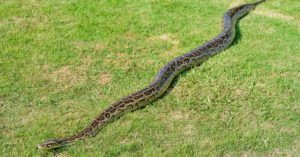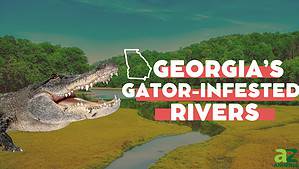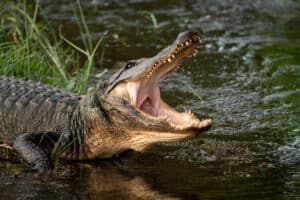In June 2016, 2-year-old Lane Graves was with his family at Disney World, Florida. Out of nowhere, an alligator grabbed and dragged him into the Seven Seas Lagoon. Horrified, his father, Matt Graves, rushed into the water. But he couldn’t save his son from the gator’s firm grasp. A dive team found his body about 16 hours later — it was one of the most gruesome gator attacks in history.
Though rare, alligators do injure and even take human lives. Furthermore, they’re not just in Florida; they live in many parts of the nation, including Mississippi, which hosts nearly 40,000 of them. So, how vulnerable are you and your loved ones in Gulfport, MS? This article answers that question, divulging where to find alligators in Gulfport and how to interact with the fast, fatal – but seldom aggressive – apex predators safely.
Where to Find Alligators in Gulfport, MS
People have spotted alligators in different parts within and near Gulfport, including around the Rio Grande drainage and Biloxi Lighthouse Pier. Sightings of these animals have also been reported in Gulfport Harbor. In 2013, a man on his way to work saw a 400-pound gator trapped in a ditch in a residential neighborhood near Airport Road and called the authorities for help.
It’s not unusual for alligators to leave their freshwater habitats, especially during the warmer months. In most cases, they travel overland to search for food and mates, not to mention steer clear of face-offs with other gators. Again, sometimes the animals come out of the water to bask since they’re cold-blooded and incapable of regulating their body temperatures.
If you encounter a gator in any part of Gulfport, contact the police or the Mississippi Department of Wildlife Fisheries and Parks. They can help trap the animal and keep the city’s residents safe.
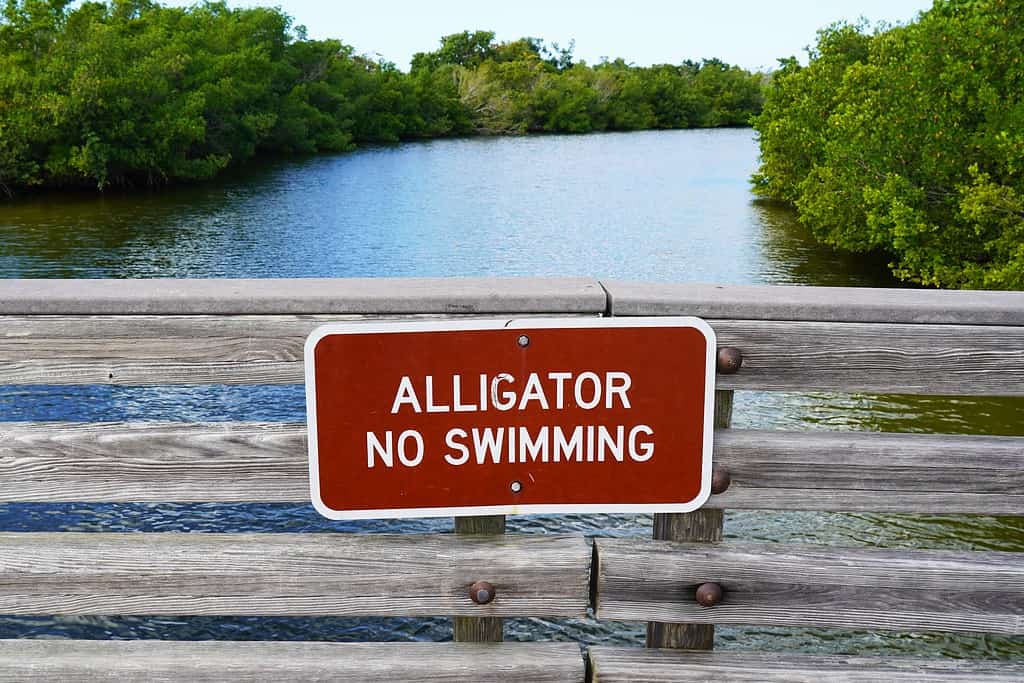
This alligator warning sign serves as an important reminder to keep your distance from alligators.
©Yordan Balabanov/Shutterstock.com
Have Alligators Killed People in Gulfport?
As of this writing, an alligator has not killed anyone in Gulfport. However, these creatures have injured many people in the city and nearby regions. For instance, in 2017, a 12-foot gator mauled a licensed trapper in Hancock County. Another one also accidentally clawed a man in Ross Barnett Reservoir in 2020.
While the residents of Gulfport have survived alligator attacks, some animals haven’t been so lucky. In 2011, the predators were believed to have killed two Bayou Bluff Tennis Club dogs. People confessed to having spotted a huge gator roaming the area before they found the canines’ decapitated bodies.
Popular Alligator Species in Gulfport
If you encounter a gator in Gulfport, it’ll probably be the American alligator (Alligator mississippiensis), mostly found throughout the state. This species resembles the vulnerable American crocodile. Males boast an average size of 11.2 feet (3.4 meters) and are usually larger than females, whose average size is 8.2 feet (2.6 meters). Both genders have armored backs with scutes (embedded bony plates) and powerful flat tails.
American alligators can live up to 30-50 years. In zoos or wildlife refuges, where they easily access food and quality healthcare, their lifespan increases to 60-80 years. Moreover, when these creatures hatch, they measure around 6-8 inches and need protection against predators to survive. But as they grow and hit about four feet in length, they become almost invincible unless attacked by other gators or humans.
When American gators reach maturity, at approximately six feet in length, their hostility also shoots up. At that point, the animals are 11-15 years old and ready to mate.
Alligators in Other Parts of Mississippi
Aside from Gulfport, Gators also inhabit other parts of Harrison County. Combined with Hancock County, the two account for 13% of the alligator population in Mississippi. Many of these creatures live in Wolf River, which separates the counties.
The Pascagoula River basin and Jackson County are home to about 25% of Mississippi’s alligator population. Mississippers have also reported seeing these representatives of the family Alligatoridae in Tunica and Coahoma counties.
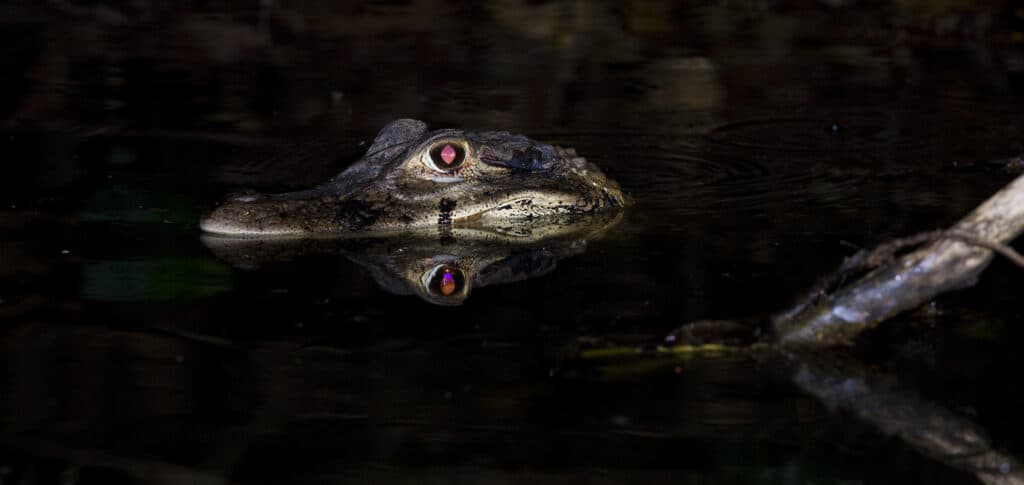
The alligator’s nocturnal habits make it difficult to spot in the darkness of night. Here, it’s silhouetted against the still waters, a reminder of the beauty and power of nature.
©Alexey Stiop/Shutterstock.com
How to Avoid and Survive Encounters with Alligators
Since Mississippi has thousands of gators, you can easily stumble upon one in Gulfport. Unless provoked, these animals rarely attack or bite humans. Nevertheless, you can’t predict their behavior, so you must be cautious around them because they still pose a considerable threat.
Alligators are intelligent, tactful hunters that often team up to catch their prey. Although they mainly attack other animals, the reptiles are also drawn to young children and the elderly, who are less likely to escape their jaws.
How can you avoid falling victim to a gator’s aggression? These tips can help you to stay safe around these creatures.
Don’t Explore Alligator-Infested Waters
A surefire way to prevent a gator from biting or killing you is avoiding alligator-infested water bodies. These creatures fancy freshwaters and mainly live in lakes, rivers, streams, and ponds. They also like stagnant water, so it’s safe to assume the latter has them and stay away.
Remember that although alligators lack sweat glands and can’t live in salt water, they can tolerate it for a few hours. Therefore, be careful when exploring saline lakes, and don’t swim in them. If you must indulge in the watersport, do it in the middle of the day because gators are primarily active at dusk and dawn.
Also, when discovering an area with alligators, stay up to 25 feet away from the water body they’re in. You’ll be even safer if you leave your small pet at home since the gator might perceive it as food and attack you.
Run When You See Gators
Unfortunately, you can still encounter alligators even when you avoid alligator-infested water bodies. For example, in March 2023, a gator walked up to a home in Daytona Beach, Florida. It charged at and bit the owner’s upper thigh when he opened his front door.
In such an instance, there’s little the victim could have done. But if you see an alligator, run as fast as you can in the opposite direction. Unlike wild animals such as bears, it’ll likely let you be, meaning you’ll be safe. At the same time, don’t try to get frisky or take selfies with gators, no matter how badly you want those Instagram-worthy shots.
Feeding alligators is also illegal in Mississippi because it could prompt the creatures to confuse humans with food sources, increasing their chances of hurting people. Other things you can do to remain safe in gator territories include:
- Don’t tease or try to play with alligators
- Don’t dispose of food near or in alligator-infested waters
- Only try to catch a gator if you’re a trained trapper
- Don’t fish near an alligator
- Keep kids away from water bodies with alligators
- Don’t ignore “BEWARE OF ALLIGATORS” signs
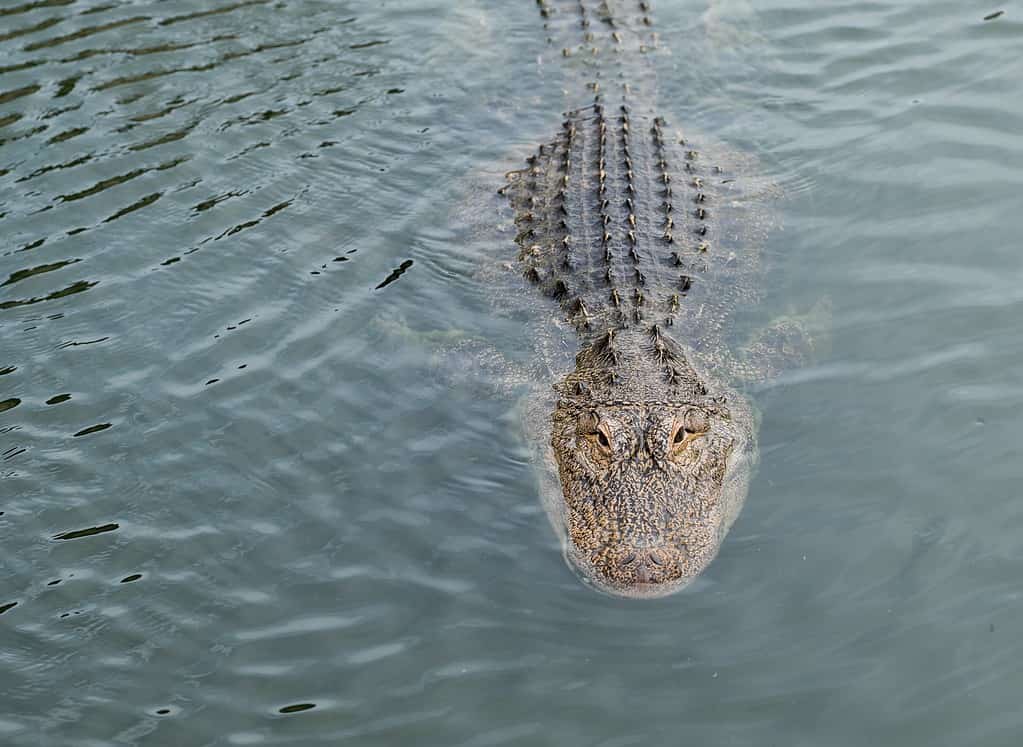
This majestic alligator can be seen gracefully gliding through the waters of its natural habitat.
©David Louis Tiffany/Shutterstock.com
Fight Back
Let’s assume you’ve done everything to avoid crossing paths with an alligator. Nonetheless, by a cruel quirk of fate, you still find yourself in the clutch of one. The animal’s bite is painful, and you’ll likely be frightened. But put up the biggest fight of your life because your survival depends on it. Gouge its eyes and attack other vulnerable parts, such as the snout. Chances are, it’ll retreat or try to reposition itself, allowing you to escape.
Fighting with a gator in the water can be a nightmare. Remember, that’s its territory, so it has the edge over you. Because you can’t run as fast, try wrapping your arms around its mouth to shut its jaw. Because they have minimal muscle power, you might be lucky to avoid their bite. While at it, be sure to scream as loud as you can to get help from nearby people.
9 Facts You Might Not Know About Alligators
Despite being deadly at times, gators are still among the most exciting members of the animal world. Here are nine things about them you might have missed:
1. Their Eyes Glow at Night
If you’re a nature blogger or photographer, visiting alligator-infested waters at night is an excellent strategy to capture incredible shots of the animals. Their eyes glow in the dark, providing an eerie but captivating experience.
Alligators’ glowing eyes enhance their survival at night by using the tapetum lucidum to reflect light into their photoreceptors and improve their vision. However, they also make it easy for humans and predators to spot them.
2. They Can Weigh Over 1,000 Pounds
It’s common to find alligators weighing more than 1,000 pounds. The biggest one discovered in Mississippi in 2017 weighed 766.5 pounds, but another found in Louisiana weighed a whopping 2,000 lbs. In 2020, the Florida Fish and Wildlife Conservation Commission revealed the state’s heaviest gator was a 1,043-pound male caught in Alachua County’s Orange Lake.
3. They Lack Endurance
Alligators are fast creatures, often reaching up to 30-35 mph on land and 20 mph in the water. Even so, they’re not endurable — they tire quickly and cannot maintain their fast speeds. That’s why if an alligator chases you on dry land, you can easily outrun it in a straight line or zigzag.
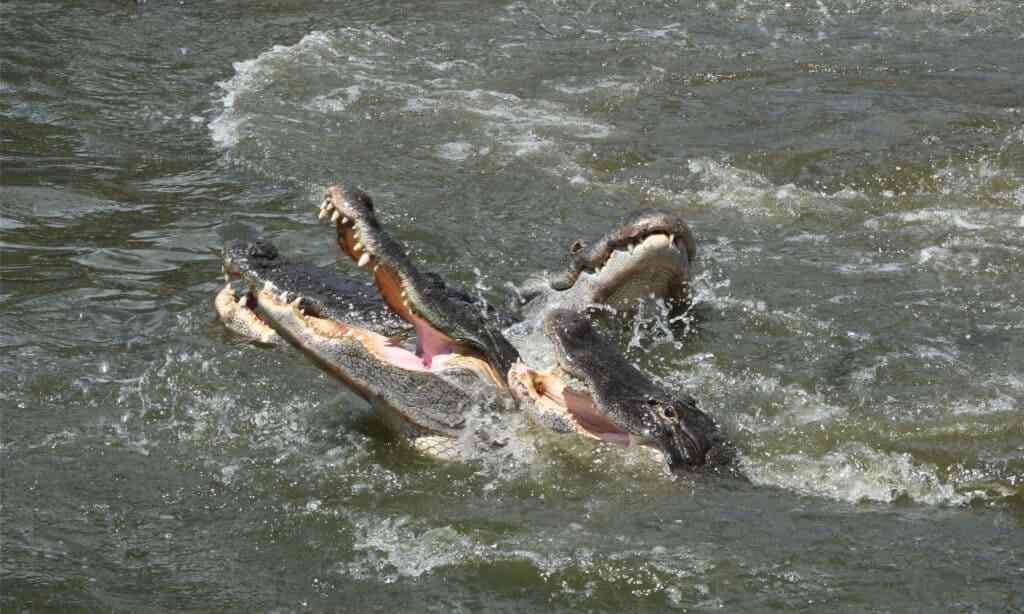
Nothing quite like witnessing the incredible spectacle of alligators feeding in their natural environment.
©iStock.com/Nigel Stripe
4. They Have Thousands of Teeth in Their Lifetimes
Typically, an adult alligator has 75-80 teeth at any given time. Because they don’t brush them, they’re more prone to wear and tear, so they break and fall out with time. Then, the animal replaces them with new ones and eventually has 2,000-3,000 teeth in their lives.
5. They Are the World’s Loudest Reptiles
Bellowing at roughly 105 dB peaks, alligators are the loudest reptiles on the planet. During the mating season, they make loud grunts to let other gators, including potential mates, know their size. Notably, these creatures are noisier than various insect species, such as cicadas.
6. They Eat Their Offspring
Although female gators are gentle and caring, they sometimes devour their offspring, explaining why baby alligator mortality is high. 6-7% of the young reptiles lose their lives to cannibalism, which sometimes helps to keep the species’ population stable.
Like the females, male alligators also eat their young. However, a litter may have different fathers, so the animals don’t even know they’re feeding on their babies. Cannibalism in the alligator world is a survival strategy as it lowers competition for resources like food. More often than not, adult gators also eat each other for the latter and mates.
7. They Are Ecosystem Engineers
Gators play a significant role in the ecosystem by digging holes to hold water handy during the dry season. The pits also provide habitats for other wildlife, including frogs, turtles, and fish. Nonetheless, these crafty ecosystem engineers eat some creatures, mostly mammals and birds.
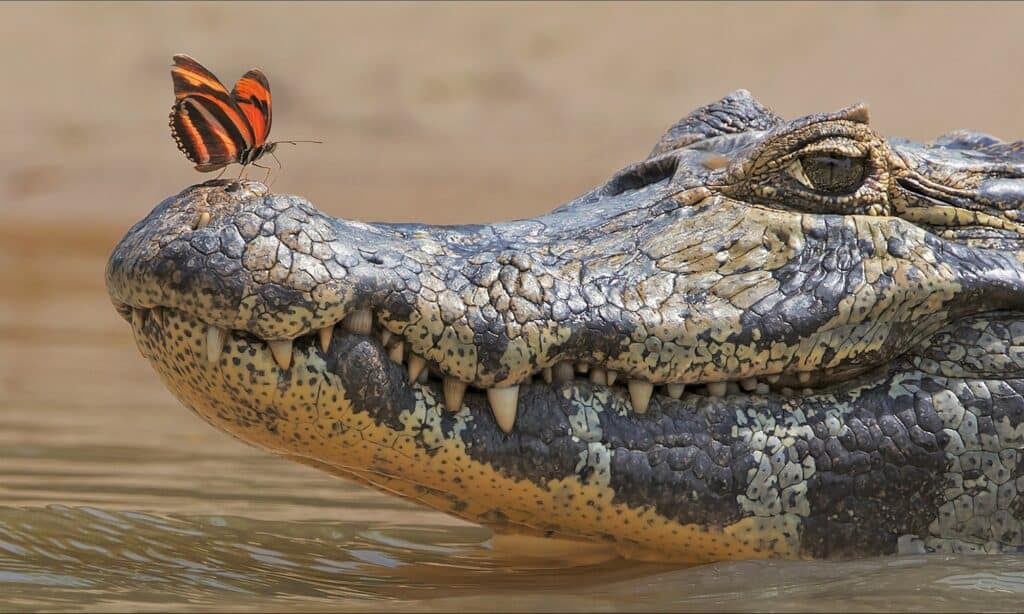
By keeping a balance between fish, birds, and other species, alligators help maintain healthy habitats for many animals in their environment.
©iStock.com/Maryna Rayimova
8. They Enjoy Fruits
While alligators are opportunistic carnivores that mainly feed on other animals, including insects, snakes, fish, birds, mammals, and smaller reptiles, they also eat fruits. Some of their favorites are elderberries, grapes, and pears. Since these reptiles climb trees, they can easily access delicious food options.
9. Albino Alligators Exist
For most people, albino alligators are a myth. But interestingly, they exist in various parts of the world. As of this writing, none has been spotted in Gulfport, although a pair hatched in a zoo in Florida in 2021. The rare species boasts pale-colored eyes and claws, with a white and pink body.
With millions of alligators worldwide, only about 200 of them have albinism. Unfortunately, their skins are sensitive to UV rays, and many barely grow into adulthood. Did you know that some people believe that looking into the eyes of these beautiful creatures stacks the odds in one’s favor?
Keeping Alligators as Pets
Are you contemplating getting a gator as a pet? Think twice. The law in Mississippi prohibits you from keeping these live animals at home. Besides, it would still be a bad idea even if it were legal for several reasons.
To begin with, caring for alligators is a tall order because they eat meals weighing at least 23% of their body weight in one session, which could cost you an arm and a leg. You also need to hire the services of an experienced veterinarian and sink more money into the necessary gear to handle the creature. Unless you’re ready to spend a lot of cash on the animal, we recommend looking for another pet.
Again, gators are naturally aggressive species. Even if you care for them for years, chances are, they’ll never consider you a ‘friend.’ You might be the first person they bite when angry, bored, or hungry.
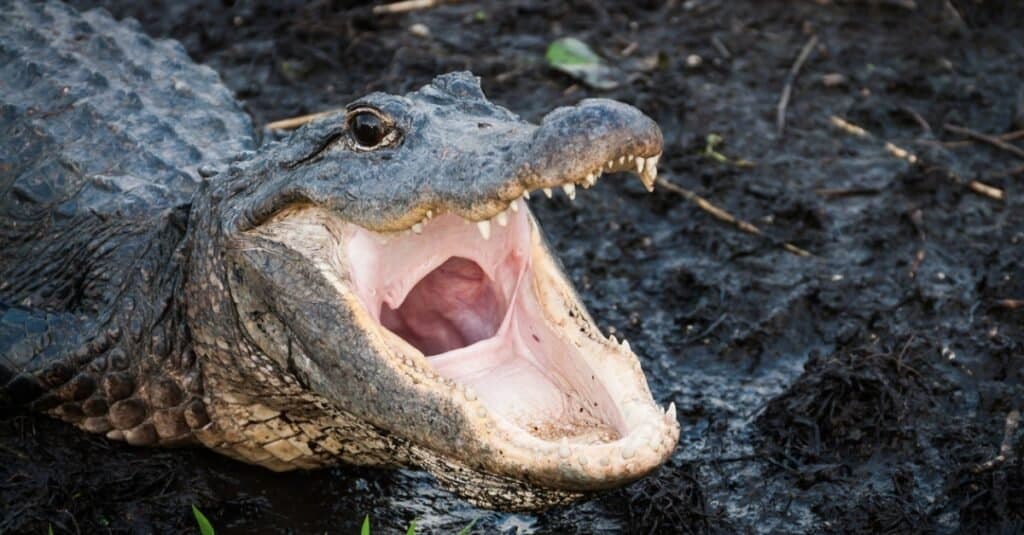
Alligators are not suitable pets for the average home. Professional care and special enclosures are needed to ensure they have a safe and comfortable habitat.
©iStock.com/unclegene
You’re Safe in Gulfport
Although many alligators call Gulfport home, you don’t have to live in fear because the creatures rarely attack people unless provoked. For instance, mother gators can bite you if you try to capture their offspring. To be on the safe side, respect the animals when you come across them by keeping a safe distance.
Also, don’t try to trap or kill alligators in Gulfport. Although they can sometimes become aggressive, these top predators are keystone species that play a critical part in maintaining balance in our ecosystem. For example, they eat many other animals, preventing the overpopulation of certain species.
If you’d like to learn more about alligators, and enjoy up-close encounters without fearing for your safety, visit nearby zoos. An excellent option is the Mississippi Aquarium, which also harbors about 200 and 50 species of fish and plants.
The photo featured at the top of this post is © iStock.com/Donna Derrick
Thank you for reading! Have some feedback for us? Contact the AZ Animals editorial team.



